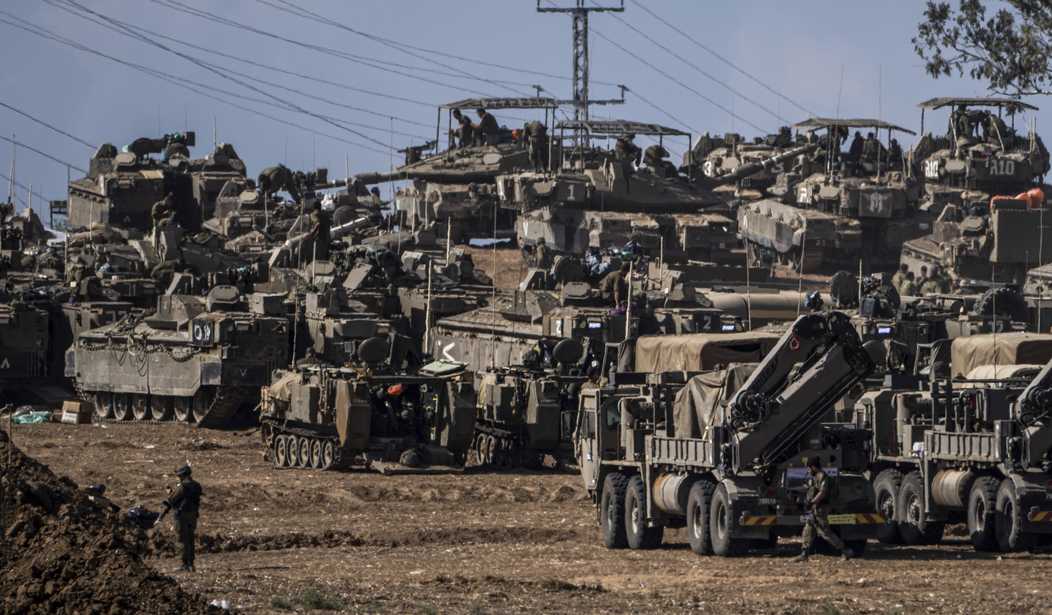And now we know why Hamas suddenly decided to release two Americans yesterday. Hamas explained the surprising decision to set free a mother and adult daughter as a “humanitarian” gesture based on the mother’s health, as well as to counter the “fascist” Biden administration’s claims about Hamas.
Now that two of the 210 hostages have been freed, however, the market that Hamas opened with this ‘gesture’ has blossomed exactly how they expected, the Times of Israel reports:
The US and several European governments are quietly pushing Israel to hold off on launching a ground invasion of Gaza following Hamas’s release of two hostages, fearing that the incursion will all but scuttle efforts to secure additional releases for the foreseeable future, a senior diplomatic official told The Times of Israel.
The Western governments currently pressuring Israel each have citizens among those unaccounted for and believe that the more time that passes, the harder it will be to secure the hostages’ release, the official said.
The senior diplomatic official said that the governments recognize that a ground invasion is very likely and are not telling Israel not to launch one at all, but rather hold off to try and see if additional diplomatic efforts can succeed.
It seems that the West hasn’t yet learned the lesson about playing along with terrorist hostaging. Hamas now knows they won’t get their initial demand of 6,000 prisoners in exchange for however many of their hostages are still alive. They are seeing, though, that they can play Israel against her allies to delay and possibly stop a devastating military operation that could end their grip on Gaza. At the very least, they can release the hostages one or to at a time for weeks, forcing Israel to delay and/or damage the relations between the Western powers enough to prevent an attack altogether.
John Hinderaker expresses his disgust with this all-too-predictable stupidity:
Hamas, playing Joe Biden like a violin–not that that is difficult–released two American hostages, giving Biden a foreign policy “victory.” But the reality is that the fate of all of the kidnap victims is in the hands of Hamas. There is no point is allowing the terrorists to manipulate Israeli policy.
As for the Gazans — to the extent they can even be separated from Hamas — John writes that they need to experience the full horror of war to ensure they don’t support starting one again:
After World War II, many Germans claimed that they didn’t know about the Holocaust. Some of them may have been telling the truth. On the other hand, no one who lives in Gaza can have been ignorant of that polity’s genocidal purposes. Further, while Hamas, like the Nazi Party, is the duly elected government of Gaza, Hamas actually got a majority of the vote, which the Nazis never did. So Gazan “civilians,” assuming there are any, need to experience the full wrath of Israel’s revenge. The situation is the same as what obtained in Germany in 1945: Gazans need to experience the full horror of war, so that the survivors’ memories of October 7 will always provoke a shudder, and no Gazan will ever again propose wiping out the Jews.
That, however, is easier said than done. Hamas has prepared for an Israeli invasion for years, and in fact clearly strategized for it. Their leadership chose to conduct an attack so ghastly and brutal that the only possible conclusion that Israelis could reach was Hamas delenda est! Hamas may have seriously miscalculated on how willing their “unified battlefield” fellow terrorists in Lebanon and Syria would be to attack into the teeth of an enraged Israel, and they may have fatally miscalculated how accurate and expansive Israeli intel is on their leadership and command centers in Gaza. But they still think that drawing Israel into Gaza will allow them to destroy the IDF, and they may well be calculating that rationally:
The attacks humiliated a security establishment that prided itself on maintaining impeccable intelligence and constant readiness. Israel’s resolve to strike back will test its military’s ability to prevail on what promises to be a chaotic and claustrophobic urban battlefield. Jungles, swamps and mountaintops are brutal fighting environments, but cities’ complexity can thwart even elite forces.
“The terrain is more challenging than any other,” said Liam Collins, a retired U.S. Army colonel who served in Special Forces. “Most militaries detest urban warfare so much that their doctrine is to avoid it.”
Israel has spent nearly two weeks pummeling the Gaza Strip. It has dropped thousands of bombs on thousands of targets, laying waste to entire neighborhoods, toppling high-rise apartment buildings and killing Hamas leaders. The goal of the airstrikes is to undermine Hamas fighters’ ability to defend the Gaza Strip when Israeli troops and tanks move in.
Israel has vowed to kill everyone involved in the attack, from its top leaders on down. More than 3,750 Palestinians—mostly women and children—have already been killed, according to the Gaza Health Ministry, and that’s before any Israeli ground troops enter the territory. During the next phase, Israel’s forces will face the kind of battlefield soldiers dread.
And this isn’t going to be like ordinary urban warfare. As I discussed yesterday on Relevant Radio with Heritage fellow John “JV” Venable, who commanded air support in the Battle of Fallujah, the Iraqis didn’t build an urban-warfare infrastructure in Fallujah. Hamas has done exactly that in Gaza, especially Gaza City, over the 17 years that they have controlled the territory. Most of the billions of dollars in aid given by the international community went into making as much of Gaza a trap for the IDF as possible. And Hamas has made sure in this instance to bait the trap as best as they could.
The Israelis know this, too. That may be one reason why they have yet to step off in force into Gaza. But another may be the successes they are currently experiencing in their air campaign. The targeted strikes on Hamas positions have racked up an impressive number of their leaders, both political and ‘military,’ which suggests Israeli intel has been good and may be getting better. Venable suggests that the Israelis may increase their use of “bunker busters” in the coming days, having succeeded already in collapsing buildings into the points where they suspect Hamas tunnels intersect and provide below-ground rapid communications. The more of that they can do, the better off their troops will be before a ground invasion takes place.
Plus, the Israelis are still busy wrapping up loose ends with Hamas in the West Bank, too:
Israeli troops on Saturday raided the West Bank home of a senior Hamas leader and detained members of his family, witnesses said.
Saleh al-Aruri is the deputy to Hamas’ overall leader Ismail Haniyeh and one of the founders of the Islamist group’s military wing. …
Troops entered Aruri’s home in Arura village, some 20 kilometres (12 miles) north of Ramallah, at dawn on Saturday, arresting more than 20 people, including one of his brothers and nine of his nephews, mayor Ali al-Khasib and witnesses told AFP.
Consider that either a brush-back pitch or maybe even a favor to Fatah and Mahmoud Abbas. A rushed ground invasion could well generate a conflict in the West Bank, and Israel understands that it will have to make sure no momentum builds up there first.
There may be several reasons, in other words, why Israel isn’t rushing into a ground invasion. In fact, one has to wonder whether we’ll see a traditional ground war in Gaza at all, or whether the Israelis have something else in mind — at least for a while. Alternately, they could decide to launch the offensive in the same hour this post goes live, if that’s what fits Israel’s war posture and national security needs. Whatever the Israelis decide, though, will likely have little to do with the tremulous advice of their allies.








Join the conversation as a VIP Member